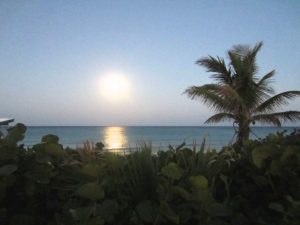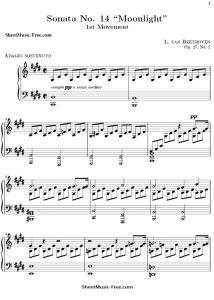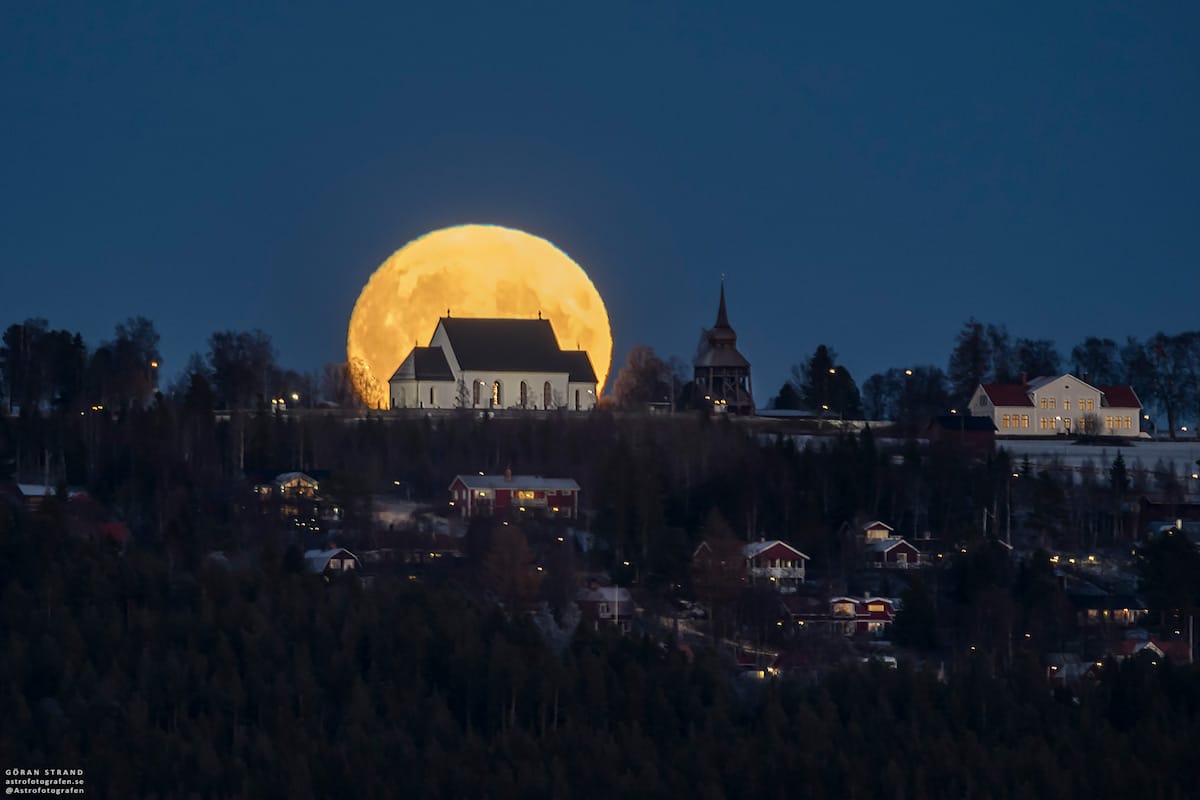Virtual Moonrise Party
 The Moon is giving us a free show this week, shining its pure light on our troubled world. In South Florida look eastward at 8:35 pm on Wednesday, April 8, when the full moon will rise over the ocean not long after the sun sets. It will be almost as full on Tuesday and Thursday, too, but rising at different times. Every spring friends in Florida gather for parties on the beach to see this lovely event. Everyone brings drinks and goodies to share. Everyone smiles.
The Moon is giving us a free show this week, shining its pure light on our troubled world. In South Florida look eastward at 8:35 pm on Wednesday, April 8, when the full moon will rise over the ocean not long after the sun sets. It will be almost as full on Tuesday and Thursday, too, but rising at different times. Every spring friends in Florida gather for parties on the beach to see this lovely event. Everyone brings drinks and goodies to share. Everyone smiles.
This year, since the beaches are closed and we must keep proper distances, I invite friends from far and near to a virtual party Wednesday evening (if clouds are forecast, Monday or Tuesday will do). All you have to do is go outside and see the moon, then listen to some music. Click on the green links to hear my favorite recordings of Moon River (1961) by Henry Mancini, Fly Me to the Moon (1954) by Bart Howard, Moon Over Miami (1936) by Edgar Leslie and Joe Burke, Blue Moon (1934) by Richard Rodgers and Lorenz Hart and/or Carolina Moon (1924) by Joe Burke and Benny Davis. Sing along! As a pianist, I love Clair de Lune by Debussy and here I offer the first movement of Beethoven’s “Moonlight” Sonata.
 When I was teaching this piece in my piano studio, I discovered the passage quoted below in one of my favorite novels, A Soldier of the Great War by Mark Helprin. It captures the “Moonlight” Sonata in prose.
When I was teaching this piece in my piano studio, I discovered the passage quoted below in one of my favorite novels, A Soldier of the Great War by Mark Helprin. It captures the “Moonlight” Sonata in prose.
Beethoven’s rolling chords are the rolling hills south of Rome where two characters in the novel are walking in August 1964. Alessandro Giuliani, 74, is a veteran of both World Wars. Nicolò Sambucca, 19, is a near-sighted boy Alessandro has recently met on a bus. In the same rhythm with which Beethoven introduces his melody, Nicolò exclaims:
Look! The moon.
Alessandro turned to the east. His cane clattered down upon the rock as he caught sight of a tiny orange dome, rising coolly, unlike the molten sunrise, from behind the farthest line of hills.
The arc rapidly turned into a silent half circle, spying upon them with its old and tired face. It had about it the air of being intensely busy, as if itsoccupation with the task of floating in perfect orbits had made it justly self-absorbed.
“The whole world stops as this stunning dancer rises,” Alessandro said, “and its beauty puts to shame all our doubts.”
It is like a dancer, Nicolò thought, as the perfectly round moon began to float airily above the silhouetted hills it had begun to illumine. “So smooth,” he said.
“Without saying anything, it says so much,” Alessandro continued. “In that sense, it’s better than the sun, which is always holding forth, and butting at you like a ram.”
Because of Alessandro’s spectacles, Nicolò was able to see that the moon had mountains and seas. His sudden apprehension of the moon, so close and full, riding over them like a huge airship, endeared it to him forever. For perhaps the first time in his life he was lifted entirely outside himself and separated from his wants. As he contemplated the huge smoldering disc he was easily able to suspend time and the sensation of gravity, and a sort of internal electricity overflowed within him. It came in waves, and grew stronger and stronger as the moon glided from orange and amber to pearl and white. And then, after only a few minutes, the soul that had taken flight returned to a body in which the heart was pounding like the heart of a bird that has just alighted from a long fast flight.
Beethoven’s famous sonata is like the Moon. “Without saying anything, it says so much.” Perhaps you heard the moon dancing and floating in my recording. I can only dream that the music transported your soul the way the moon did for Nicolò, or at least, separated you from your wants. Hear the other two movements of this masterpiece by two wonderful professionals. Daniel Barenboim plays the short second movement.
For the presto final movement, here is Valentina Lisista:
The Moon has long inspired opera composers, too. Thanks to the Metropolitan Opera’s free streaming during this pandemic, I listened to Bellini’s Norma last night. The first act presents a vocal musical tribute to the beauty and power of the moon, when Norma, a Druid priestess, sings the beautiful bel canto aria, Casta Diva (chaste goddess).
Chaste goddess, who dost bathe in silver light
These ancient, hallowed trees,
Turn thy fair face upon us,
Unveiled and unclouded…
Temper thou the burning hearts,
The excessive zeal of thy people.
Enfold the earth in that sweet peace
Which, through Thee, reigns in heaven….CHORUS: Enfold the earth in that sweet peace
Which, through Thee, reigns in heaven.
Hopefully, the moon will be “unveiled and unclouded” when you go out to behold it. Here is Norma’s aria, sung by Renée Fleming.

Leave a Reply